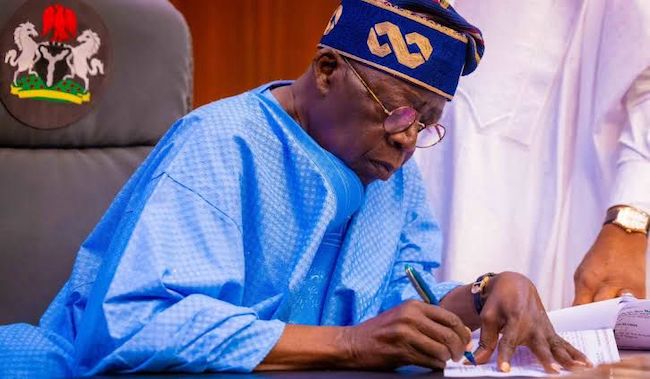Nigeria’s President, Bola Tinubu, has pledged to institute a national minimum wage exceeding N60,000 for Nigerian workers.
This commitment was made during a meeting between the Federal Government and organized labour on June 3, 2024.
The joint statement, signifying the resolution, was endorsed by Mohammed Idris, Minister of Information and National Orientation; Nkeiruka Onyejeocha, Minister of State for Labour and Employment; Joe Ajaero, President of the Nigeria Labour Congress (NLC), and Festus Osifo, President of the Trade Union Congress (TUC).
The resolution was disseminated by the spokesperson for the Information Minister, Rabiu Ibrahim.
Organized labour had declared a nationwide strike on June 3, 2024, advocating for a proposed minimum wage of N494,000.
In response, the Federal Government convened a meeting with labour representatives at the office of the Secretary to the Government of the Federation on the same day.
The Federal Government has decided to increase its proposed minimum wage from N60,000. Meanwhile, labour has agreed to reconvene with its constituents to deliberate on Tinubu’s recent proposal.
The resolution states:
“I. The President, Commander-in-Chief of the Armed Forces, Federal Republic of Nigeria, is committed to a National Minimum Wage that surpasses N60,000;
II. As a result, the Tripartite Committee will convene daily for the next week to reach an agreeable National Minimum Wage;
III. In recognition of the President’s commitment, labour agrees to promptly convene a meeting of its constituents to discuss this commitment and
IV. No worker will face repercussions due to the industrial action.”
Key Points:
Initially, the NLC and TUC proposed a new wage of N615,000, which was later negotiated to N494,000. However, the government maintained its stance on a N60,000 minimum wage, citing sustainability concerns. The organized private sector, part of the tripartite committee, supported the government’s proposal, leading to the NLC’s nationwide strike without a specified end date. Labour representatives criticized the government for lacking data supporting their offer, exacerbating tensions. The ongoing discord between organized labour and successive administrations often results in legal disputes.











